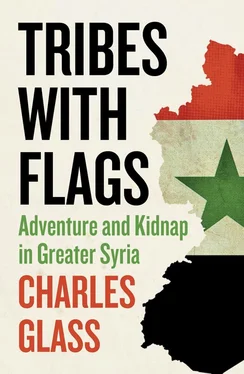Walking through the streets, which were becoming more crowded as the morning grew late, Munir used his few words of English, gestures and the gift of an expressive face to tell me that his life was unhappy. He was a Shüte in a Sunni Muslim country. He was half-Iranian in a land which distrusted Iran. His father was dead. He owed taxes on his father’s restaurant, which had closed as a result. He had to care for the rest of his family in Alexandretta, and he yearned for the cosmopolitan life of Istanbul. “Maybe one year,” he said. “Maybe two.” Then he could leave Alexandretta again for the pleasures of the north.
We found Kavak’s office in a modern, if run-down building, up two flights of stairs, past various shops selling women’s clothes and building supplies. A dark-haired man in his mid-thirties opened the door marked “avukat”, introducing himself as Yalçin Kavak. We followed him into a room filled with law books and a large desk covered in papers. There seemed to be no picture of Atatürk, but a small staff displayed a Turkish flag. We had been squeezed into the little office for a few minutes when Kavak invited us to lunch. Munir had to leave for an appointment, but said he would see me later at Mehmet Udimir’s library.
Kavak took me to what was called a “popular” restaurant, the Büyük Ekspres Lokantasi, for “typical” Turkish food. We found ourselves in a large rectangular room, with simple wooden tables and chairs. The walls were bare except for the mandatory portrait of Atatürk. Neither the fan nor the lights overhead were on. We sat at a table near the front window. There was no menu. A waiter asked us what we wanted. When we asked what was available, he told us to come into the kitchen. The kitchen was divided from the dining- room by nothing more than a glass-fronted refrigerator and a food warmer, both chest-high. In the refrigerator were huge chunks of raw meat, lying in trays of blood, chops, beef, spiced minced meat called kofta, all ready for grilling, and salads and cold vegetables. The warmer was full of stews, cooked vegetables, meat pies and dolma, stuffed vegetables like vine leaves and courgettes. Kavak advised me to have a kebab of beef and aubergines, with yogurt, hommous and cold artichokes to begin. The waiter looked pleased with the choice.
The restaurant was filling up with working men, businessmen and a few families with children. The waiter brought me an Efes beer, a Turkish lager apparently from Ephesus, which was cold and tasted good. Between bits of food and drink, we talked about Turkey, religion, politics and the Arab world which Turkey had once ruled and had since forgotten.
“Today in Turkey,” Kavak said, “there are some conservative people who dream of the return of the Ottoman Empire, but the military wants democracy. Meanwhile, Russia is working underground here. It wants to take advantage of Turkey.”
A minute later, he said, “Atatürk was from Thessaloniki. He was very keen on Europe and on democracy. It was very hard for Turks to accept a democratic way of life. Eighty per cent of the people think this country should be European.”
Eating my eastern food, I found it hard to think of this country as a part of Europe. All the food was good, similar in substance to that in the rest of the eastern Mediterranean, but spicier and prepared slightly differently. The hommous, a familiar paste of mashed chick-peas and tahina, was made in a Turkish way, covered not only with olive oil, as in Lebanon and Syria, but with ground red and black pepper, whole green chilli peppers and slices of tomato. As in Syria, we scooped it up with warm, flat bread, but the bread was thicker than Arabic bread and had seeds on top. Delicious as the food was, in Europe it would always be “ethnic”.
Turkey nonetheless had applied to join the European Community. Kavak said the prejudice against Turkish membership was unfair, particularly when it was based on history. “There were problems in 1914. There was persecution of the Armenians and Assyrian Christians, but it is wrong to blame Turkey for the actions of the Ottoman Empire. We do not blame West Germany today for Hitler.”
I asked him about the city. “Iskenderun,” he said, using its proper name in both Turkish and Arabic, “has changed. It was a famous seaport, very deep, for big ships. It is close to Iraq. It has been very important in supplying Iraq in the war against Iran. Many people came from eastern Turkey to settle here. We have the biggest iron and steel factory in Turkey, ISDEMIR.” ISDEMIR was the acronym of the state-owned Iskenderun Demir Celik. “The factory has 16,000 employees and 2,000 managers. This is 18,000 people plus their families. All were brought from outside.”
“Has this shifted the population balance here in favour of Turks?”
“Until 1964, perhaps sixty per cent of the people here were Arabs and forty per cent Turkish. The Arabs were mainly in agriculture and fishing. Today, the population of Iskenderun is approximately 175,000. Twenty-five per cent maximum are Arabs. The other seventy-five per cent are Turkish, with some Kurds.”
“Did they all come here for work?”
“The eastern cities in Turkey do not offer enough. People have to come to the western cities to progress. Even me, I was a lawyer in the east, in Merdin. I was doing well there, but I had to come to Iskenderun.”
“Is there any Syrian influence here?”
“If you study Hatay,” he said, using the Turkish name for the province, “you must look at Syria. In Syria, I think twenty-five per cent of the people are Alawi, forty-five per cent are Sunni and thirty per cent are Christian, including Armenians and Assyrians. The man who became president of Syria is Alawi. He didn’t come to power democratically. He wants to remain president. He puts Alawis in important positions, as military commanders and security police. He is afraid. Of what? Who is against him? The Muslim Brothers, the Iraqi Baath Party. Because of this opposition, twenty-five per cent of the population is not enough for him. This is why, I heard, clever young Alawis from Samandag, in the far south, are being taken to study at the university in Damascus. They study medicine or go into the military and don’t come back.” The Alawis are a dissident sect of Shiite Muslims, who live mainly in the hills along the sea between northern Lebanon and Alexandretta.
Kavak said he had been active in politics. “Before 1980, I belonged to the Social Democratic Party, the democratic left. In Turkey, the Communist Party is forbidden. This is why some people who are not social democrats, but Marxists, work in the Social Democratic Party. They work together and support each other. If you want to succeed, you have to cooperate with the communists. I did not want to. Also, with my work, I don’t have enough time.”
When the waiter brought us the main course, I reflected that Kavak was an unusual man, though just how unusual I had yet to discover. He looked like a conventional lawyer in his dark three-piece suit, his hair combed neatly back, his face shaved. Yet he had mentioned things that were banned in Turkey: 1914, Armenians, Kurds, Alawis who looked to Syria. In official Turkish doctrine, no massacres took place in 1914; there were no Armenians; Kurds were “mountain Turks” Alawis were Turkish without ties to the Arab world. Denial of reality was official policy.
“I was raised a Muslim,” he said, “but I became a Christian in 1970.”
The surprise on my face was difficult to conceal. In all the years I had spent in Muslim countries, I had met only one convert from Islam to Christianity, a professor of philosophy at the American University of Beirut. I had met many converts who had gone the other way, from Christianity to Islam. In Cairo, I knew an American Jew who had become a Muslim. Western Protestant missionaries in 19th-century Syria concluded after many failed attempts that Muslims could not be converted to Christianity, so they concentrated instead on turning eastern Christians, Catholic and Orthodox, into Protestants. Kavak was the first Turkish Muslim I met who had become a Christian. He was not to be the last.
Читать дальше












